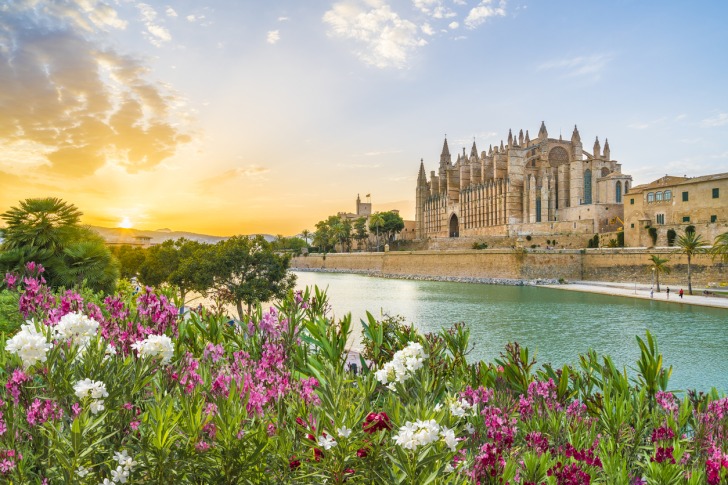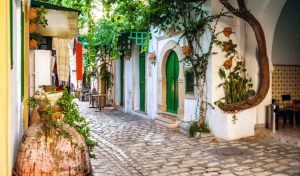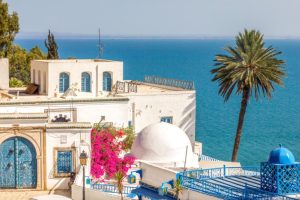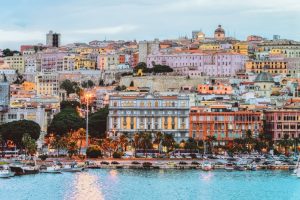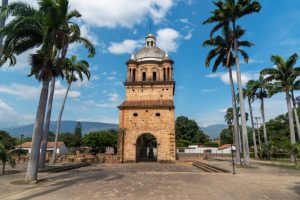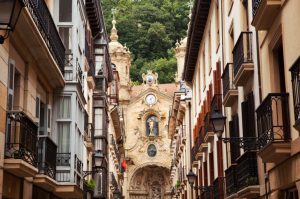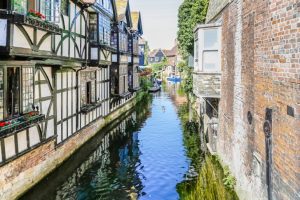 Spain : Safety by City
Spain : Safety by City
- Alicante
- Andorra la Vella
- Barcelona
- Bilbao
- Cadiz
- Canary Islands
- Granada
- Ibiza
- Las Palmas
- Madrid
- Malaga
- Murcia
- Palma de Mallorca
- Pamplona
- Salamanca
- San Sebastian
- Seville
- Valencia
- Zaragoza
Palma de Mallorca, Spain, is the crown jewel and the capital of the Balearic Island of Mallorca.
This watery wonderland located along the banks of the Mediterranean Sea is a popular tourist destination.
Tourists rave about Palma de Mallorca’s sunkissed beaches and charming Medieval decor.
Many liken this beachfront city to an almost perfect paradise.
If you’re thinking about traveling to the capital of the country – this guide is for you!
Our guide provides a comprehensive overview of common warnings and dangers that affect travelers and tourists.
Read on to learn about safe neighborhoods in the city and which neighborhoods to avoid.
Later, we provide a few location-specific travel safety tips and information on essential travel topics like Visas, local currency, and nearby airports.
Warnings & Dangers in Palma de Mallorca

OVERALL RISK: MEDIUM
Official online crime and safety reports from global data analysts like Numbeo and reports from recent visitors of Palma de Mallorca show that the city is relatively safe for both travelers and locals. The overall risk grade assigned to this coastal city falls into the medium category.

TRANSPORT & TAXIS RISK: LOW
Palma de Mallorca visitors will be happy to learn that the overall risk level for becoming the victim of a taxi scam in the city is low. The city boasts a wealth of licensed and reliable taxi services that transport travelers without incident. Choose to ride with licensed taxi drivers to avoid risk.

PICKPOCKETS RISK: MEDIUM
While the city of Palma de Mallorca is considered generally safe for travelers, highly populated travel areas and resorts are often hotbeds for local pickpockets. Pickpockets in tourist areas often seek to steal valuables like cell phones and cash from the back pockets of unsuspecting tourists.

NATURAL DISASTERS RISK: LOW
The risk of natural disasters occurring in Palma de Mallorca is on the lower end with one exception. This city experiences infrequent bouts of flooding that can happen suddenly and cause damage and then not happen again for up to a decade.

MUGGING RISK: LOW
Tourists seeking to relax and take in the sights in and around Palma de Mallorca can breathe easier when they know that the mugging risk in the area is very low. While violent crimes against locals and tourists do happen in the area, these incidents are infrequent.

TERRORISM RISK: MEDIUM
The current risk of terrorism in Palma de Mallorca Spain is about average for most countries. US travelers should note that the State Department’s latest travel advisory is at level two and recommends travelers to “exercise increased caution” when traveling in the area.

SCAMS RISK: MEDIUM
While the overall environment in Palma de Mallorca is safe, visitors should beware of tourist scams. Charging tourists higher prices for local goods and services is a common practice in the area. *Note: Research the costs of the goods and services you plan to use in advance to avoid becoming the victim of a tourist scam.

WOMEN TRAVELERS RISK: LOW
While solo women travelers in Palma de Mallorca can explore the city and feel relatively safe, they should still take common-sense precautions to avoid becoming the victim of a violent crime or property crime while traveling in the area.

TAP WATER RISK: LOW
Research and local water quality reports show that the drinking water running through many of Palma de Mallorca’s hotels, restaurants, and other travel venues is treated and deemed safe for tourists and visitors. Travelers with concerns or those with special needs should consider bottled water for their trip.
Safest Places to Visit in Palma de Mallorca
It is important for travelers to note that the city of Palma de Mallorca reports few incidents of violent crimes and property crimes against travelers and residents.
However, incidents of crime do happen here.
Some of the safest and most interesting places to visit in Palma de Mallorca include the following.
Castell de Bellver Castle: Travelers can enjoy panoramic views of the city while learning about important historical happenings at the 14th-century royal Bellver Castle.
Playa de Cala Mayor: The area’s most popular tourist spots include sandy beaches like the Playa de Cala Mayor which have been deemed safe for tourists.
The Old Town: Listed by many previous visitors as one of Palma de Mallorca’s “must-see” attractions.
The Old Town district features a variety of shopping, dining, and entertainment options that keep tourists coming back for more.
Places to Avoid in Palma de Mallorca
Son Gotleu: Local crime reports from officials and residents say to steer clear of Son Gotleu – especially at night.
This area has become known for higher rates of crime and violence including drug activity and shootings.
Avoid Waterfront Areas at Night: Safety-conscious travelers can stay out of harm’s way by avoiding visiting local waterfront areas at night when reports of pickpocketing and other crimes are higher.
Steer Clear of Civil Demonstrations and Crowds: While the terrorist threat in Palma de Mallorca has been deemed low, the latest reports from the US State Department recommend that travelers steer clear of civil demonstrations and large crowds as the potential for violence and civil unrest are higher.
Safety Tips for Traveling to Palma de Mallorca
Now that you have some general information on warnings and dangers in Palma de Mallorca, you might still have a few questions about how to keep you and your fellow travelers safe when visiting this picturesque Spanish vacation haven.
Following are ten location-specific travel tips to help travelers stay safer when visiting Palma de Mallorca.
- Learn Conversational Spanish. Stay informed and abreast of the potential for crime, natural disasters, and other local news by learning conversational Spanish. Learning basic conversational skills will help you communicate clearly with the locals and decrease the likelihood of becoming a victim.
- Only Use Licensed and Verifiable Transportation Services. The few taxi-related scams that have been reported in Palma de Mallorca are usually affiliated with unlicensed drivers. Only used licensed and verifiable taxi and rideshare services to avoid becoming the victim of a taxi scam while traveling.
- Keep Your Valuables Close and Secure. The rates of pickpocketing and similar crimes are much higher in Palma de Mallorca than in other crimes. Travelers should secure their valuables in hotel safes or other secure locations and keep valuables like jewelry, cell phones, and cash out of sight from lurking criminals.
- Check the Weather Reports Before Traveling. While the natural disaster risk for Palma de Mallorca is pretty low, the chances of experiencing the effects of flooding like mudslides and standing high water are felt throughout the region when rain storms drench this location with water.
- Always Stay with Your Travel Party. Don’t be overconfident when traveling abroad. While the city is mostly safe, crimes of opportunity can still happen to distracted tourists. Always remain with your travel group or travel buddy and avoid walking in abandoned or sketchy-looking areas alone – especially at night.
- Avoid Getting Caught Up in Civil Demonstrations and Crowded Places. The US State Department reports that rates of civil unrest and public demonstrations have been increasing in Spain. They advise staying away from public demonstrations and overly crowded places where violent crime or terrorism-related acts can take place.
- Verify Prices for Local Goods and Services and Only Buy from Reputable Vendors. Palma de Mallorca is a welcoming paradise that also has its share of nefarious criminals on the lookout to illegally inflate the prices of local goods and services for unsuspecting tourists. Avoid price-gouging scams by researching the costs of the products and services you plan on using before arrival.
- Get Travel Insurance to Protect Your Trip. Investing in travel insurance is a great way to protect your trip against unexpected mishaps and losses that can end up costing precious time and money. Unexpected mishaps that can happen during European travel include emergency medical expenses, lost, stolen, or delayed baggage, or indefinite travel delays.
- Connect to Local Resources. Connect with local resources online to stay on top of the latest news, weather, crime, and entertainment updates while traveling in Palma de Mallorca. Local resources can be found online, via a Google search, or by downloading news-related local apps and travel guides to your cell phone.
- Register Your Trip with the STEP Program. Unexpected emergencies can happen – no matter where you are in the world. Be proactive and register your Spain trip with the US State Department. The State Department helps to connect US travelers with key resources and support services within their local area when traveling abroad.
So... How Safe Is Palma de Mallorca Really?
Palma de Mallorca is a relatively safe destination for travelers and residents alike.
This coastal European destination offers a beautiful escape and haven for US travelers seeking to bask in the sun.
People in this region enjoy a good quality of life and experience relatively few incidents of violent crime.
The biggest concerns for tourists traveling in Palma de Mallorca generally happen when someone is in the wrong place at the wrong time.
Avoid becoming a victim of one of the area’s few incidents of pickpocketing by steering clear of large crowds and public demonstrations where tourists can easily become distracted.
Use reputable service providers for hotels, entertainment, dining, and travel to reduce your chances of being victimized by local transportation scams or price-gouging scams where obvious tourists are charged higher prices for local goods and services.
How Does Palma de Mallorca Compare?
| City | Safety Index |
|---|---|
| Palma de Mallorca | 57 |
| Andorra la Vella | 89 |
| Madrid | 68 |
| Barcelona | 67 |
| Valencia | 69 |
| Bilbao | 52 |
| Granada | 58 |
| Manama (Bahrain) | 54 |
| Tianjin (China) | 67 |
| Brussels (Belgium) | 60 |
| Shanghai (China) | 66 |
| Belize City (Belize) | 37 |
| La Paz (Bolivia) | 52 |
Useful Information

Visas
US visitors to Palma de Mallorca may be eligible to enter the country and visit for up to ninety days without requiring them to secure a Visa. Check with the US State Department and the Palma de Mallorca Airport to learn about Visa requirements for individuals with special circumstances.

Currency
The Euro is the local currency of Palma de Mallorca. US tourists can exchange USD at online currency exchanges, local area hotels, local ATMs, and at currency exchanges.

Weather
Tourists appreciate the mild climate where the average annual temperatures remain relatively stable throughout the year. Palma de Mallorca experiences a Mediterranean climate where mild dry winters and hot dry summers prevail.

Airports
The city of Palma de Mallorca is served by its own international airport of the same name. This highly-rated airport features onsite amenities for dining and between-flight entertainment where travelers can meet their needs between flights.

Travel Insurance
Travel insurance helps to protect you and your fellow travelers from issues related to cancelations, lost or stolen baggage, and a host of other travel-related services that can save money in times of emergency. Get travel insurance to protect your trip and have greater peace of mind when visiting Palma de Mallorca, Spain!
Palma de Mallorca Weather Averages (Temperatures)
Average High/Low Temperature
| Temperature / Month | Jan | Feb | Mar | Apr | May | Jun | Jul | Aug | Sep | Oct | Nov | Dec |
|---|---|---|---|---|---|---|---|---|---|---|---|---|
| High °C | 15 | 16 | 17 | 19 | 23 | 27 | 30 | 30 | 27 | 24 | 19 | 16 |
| Low °C | 8 | 8 | 9 | 11 | 14 | 18 | 21 | 22 | 19 | 16 | 11 | 9 |
| High °F | 59 | 61 | 63 | 66 | 73 | 81 | 86 | 86 | 81 | 75 | 66 | 61 |
| Low °F | 46 | 46 | 48 | 52 | 57 | 64 | 70 | 72 | 66 | 61 | 52 | 48 |
Spain - Safety by City
| City | Safety Index |
|---|---|
| Alicante | 77 |
| Andorra la Vella | 89 |
| Barcelona | 67 |
| Bilbao | 52 |
| Cadiz | 74 |
| Canary Islands | 81 |
| Granada | 58 |
| Ibiza | 82 |
| Las Palmas | 74 |
| Madrid | 68 |
| Malaga | 76 |
| Murcia | 83 |
| Palma de Mallorca | 57 |
| Pamplona | 81 |
| Salamanca | 59 |
| San Sebastian | 56 |
| Seville | 71 |
| Valencia | 69 |
| Zaragoza | 79 |
